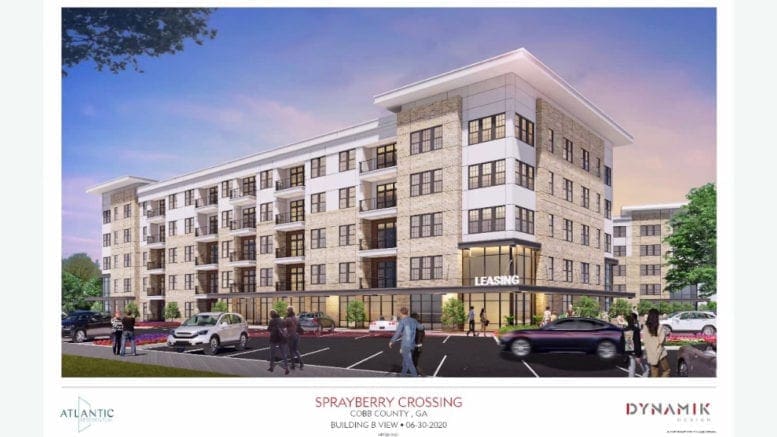After years of community complaints, the Sprayberry Crossing shopping center might be getting a makeover with the help of a previously unused Cobb County zoning ordinance called a redevelopment overlay district (ROD).
Atlantic Residential submitted a proposal for a mixed-use development at 2692 Sandy Plains Rd. that includes a 30,000 square foot national grocer, 20,000 square feet of retail, 12,000 square feet of office space, 122 senior living apartments, 50 for-sale townhomes, and 178 conventional one and two-bedroom apartments. The application, which can be read here, states that the developer is requesting designations for NS (neighborhood shopping), PSC (planned shopping center district) and ROD for the 15-acre property.
An overlay district is not by itself a zoning designation. It “overlays” an existing zoning district to make it more adaptable. In this case, if approved, it would provide more flexibility to details such as density, height, buffers and setback requirements than the underlying zoning district.
Cobb County originally adopted the redevelopment overlay district in 2006. Amendments were made in 2010 and 2017, but according to District 3 Commissioner JoAnn Birrell, it has never been used before. Birrell led an online meeting Wednesday to address the zoning process for the property due to the high level of community interest.
According to the Cobb development code, “the ROD is established to provide locations for redevelopment of commercial, office and residential uses which are pedestrian oriented and developed at a community or regional activity center scale and intensity, as identified for each specific site or corridor via the Cobb County Comprehensive Plan, as may be amended from time to time. This is intended to encourage compatible mixed uses within the boundaries of these properties.”
The rental apartments have proved one of the more controversial aspects of the project. Jason Gaines, planning and economic development manager for Cobb County, addressed the concern that it will lead to more apartments being built in the area, by pointing out the statement in the code which expressly states that “any redevelopment project approved within a ROD shall not establish any type of precedent for land use recommendations or future rezoning proposals outside of the boundaries of the ROD project.”
In an email, Gaines told the Courier this is the first time a developer has applied for use of the ROD.
“The zoning and entitlement process is applicant driven. Land owners/developers have the right to apply for any zoning district or to use any provision within the zoning code that they feel would allow them to use their property for their desired purpose. It is up to the Board of Commissioners – with assistance from the Planning Commission and county staff – to determine if such requests merit approval,” Gaines wrote.
If the ROD is approved it will bring another contentious topic back to the forefront – low income housing. At a community meeting in July, the developer said the plans didn’t include low income, but if the ROD is applied, it includes a provision that 10% of the residential units be set aside for occupants making no more than 80% of the area median income (AMI).
The senior living and apartment buildings in the current site plan are five stories. In an earlier plan, they were four stories, but the developer said they were raised to shrink the footprint and increase greenspace. The rooflines were reduced as compensation. However, there are members of the community who say this is too high and not in keeping with the surrounding area which largely consists of two-story residential homes and single-story businesses. The ROD states that height should be compatible with surrounding uses.
Two Facebook groups have formed in response to the ongoing neglect and plans to redevelop the property. The first was Sprayberry Crossing Action in 2017 to push operator NAI Brannen Goddard to either repair the property or sell it to be redeveloped. It has about 5,700 members. In 2018, the parcel housing the former bowling alley was deemed blighted in court and made subject to the blight property tax at seven times the millage rate.
Another group formed in August 2019 is called Residents Against Apartments in Sprayberry Crossing. A petition circulated by the latter group has garnered nearly 500 signatures opposing the development as currently proposed.
The proposal for Sprayberry Crossing will go before the planning commission on Sep. 1 at 9 a.m. and the Cobb County Board of Commissioners on Sep. 15. Though the property is in Birrell’s district, she urged interested parties to reach out to the entire board with feedback.

Rebecca Gaunt earned a degree in journalism from the University of Georgia and a master’s degree in education from Oglethorpe University. After teaching elementary school for several years, she returned to writing. She lives in Marietta with her husband, son, two cats, and a dog. In her spare time, she loves to read, binge Netflix and travel.

I do not approve of the use of the ROD Zoning Ordinance for the proposed development on the blighted Sprayberry Crossing property. The flexibility of the zoning creates questions and uncertainty for homeowners in this vicinity as to what future negative changes the developers could decide to make; especially pertaining to the 178 conventional apartments where this ordinance would allows for 10% of the 178 apartments to be low income which could constitute problems down the road. Actually, I prefer no conventional apartments at all and only senior citizen apartments if there has to be apartments at all. Five story apartments do not fit into our residential area!!! These apartments will hurt the values of our homes and property.